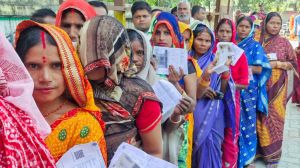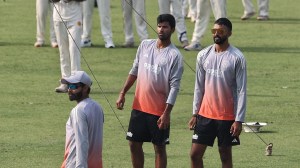LoC … the real story
The rain has stopped and the sunshine peers wearily through the curtain of dense clouds. Our car slips and slides over the dirt track made m...

The rain has stopped and the sunshine peers wearily through the curtain of dense clouds. Our car slips and slides over the dirt track made muddy by the early morning downpour, as it clings to the meandering path up towards the Haji Pir mountains. Around the final bend the road peters out, ending suddenly with a steel bridge. Silikote, where the army stands guard at the last Indian post on the Line of Control (LoC), is a 30 minute climb up.
Ghulam Qadir Chalkoo lives in a two-storey house with his eight children at the edge of this hamlet. At the door, his 13-year-old daughter Rubina Bano welcomes us with a smile and ushers us in. The small dark grimy room is empty, apart from a rug and a few moth-eaten pillows.
‘‘Where is Pakistan?’’ I ask Rubina as she sits in a corner cuddling her younger sister. She stands up and throws open the window. ‘‘This is Pakistan,’’ she says. Before us lie two ridges, made of one stone but divided by two countries — India and Pakistan.
Across the Telawadi, a clear, fast-running stream, we see a collection of small kothas, mountain houses with distinctive flat roofs, and between them a series of figures walking in the dim light of the winter afternoon. It is the closest Pakistani village on the other side. ‘‘You could not see anybody out in the open there just a month ago,’’ says Ghulam Qadir. ‘‘They (the villagers) returned home only after the guns went silent on Eid recently.’’
Silikote too is enjoying its first peaceful winter in a long, long time. ‘‘You would have never imagined walking safely to my house earlier,’’ Qadir says, as he points to the holes in the tin roof. ‘‘They (Pakistanis) would rain bullets and shells almost everyday. It would start so suddenly, we would have no time to even hide.’’
Qadir lost his wife, Sajja Begum, only a few months ago when bullets ‘‘coming from across’’ riddled her body while she was grazing cattle less than 100 metres from her house. She died leaving behind eight children. The youngest, Gulshan, is two.
Qadir’s eldest child is Irshad Ahmad — a 19-year-old boy who was the family’s first victim of cross-border shelling. A huge shrapnel of an artillery shell pierced through his leg, maiming him for life. ‘‘I wish this ceasefire had come earlier,’’ he says. ‘‘I would have been okay. My mother would have been alive. You can’t imagine how difficult it is to walk on these crutches. At times, I wish that shell had killed me instead.’’
Irshad’s life has literally come to a halt since that day in November 2001. He was bed-ridden for months, life can never be the same. ‘‘I am happy it is safe now,’’ he says, ‘‘I hope this ceasefire never ends. I can’t even run to hide myself if the firing starts.’’ Then he adds, almost as an afterthought, ‘‘My life is over. At least my brothers and sisters will be safe. I don’t want to lose them.’’
Irshad’s father, Qadir, says while uncertainty still looms large in this border village, the past was worse. ‘‘It was neither war nor peace here,’’ he says, ‘‘Every morning, when I would leave home, I would look at my children thinking I might not see them again. I would feel restless the entire day. And when I would return, if any one of them was not there, I would go crazy.’’
It was not the fear of shells and bullets alone. The ‘‘surrounding area is heavily mined’’.
SHER Khan — who heads the police post in the village — too is around. He rushed to Qadir’s house after he heard some strangers had been seen walking about in the village. An old man, he introduces himself as a descendant of the Mughals. ‘‘I belong to a neighbouring village and we were the rulers here once,’’ he says proudly. ‘‘My cousins live across in ‘Azad’ Kashmir (Pakistan-occupied Kashmir). I have heard they are important people there but have never met them. It has been a long time since 1947.’’
Sher Khan and his men would never dare to venture out in uniform, till the guns went silent in November. ‘‘They (Pakistanis) would watch every movement. And they would not waste a second if they saw anybody wearing a uniform,’’ he tells us, ‘‘I was lucky to escape death thrice in the two months before the ceasefire. They knew the location of our police post and would constantly pound the area. We would hide in the underground bunker.’’
|
Irshad Ahmed
At 19, this Silikote boy lost his leg to routine cross-border shelling. Another shell killed his mother recently. |
| <../sunday/newspic/20040104/bw5.jpg" width"200" height"133" vspace"4"> “I wish the ceasefire had come earlier. I would have been okay… My mother would have been alive.” |
To emphasise the point, Khan brings out a used cartridge collected from near the police post: ‘‘See, this is the stuff that used to fly all around here. It can pierce through a rock, not to talk of a human body.’’
Half a mile away, we see beautiful concrete houses with cute tin roofs scattered across the slope of a ridge. Who lives in that hamlet? Khan smiles, ‘‘That is Churanda village and, yes, people are affluent there. Many of them are government servants.’’ He gives Qadir a knowing look. Evidently there is more to Churanda’s affluence than government salaries.
Khan reveals the secret, ‘‘These past few years have been tense here. Otherwise life wasn’t that awful. These villagers would easily sneak across … It is just a 10 minute walk. You had to take a bottle of whisky across and you would bring back a Panasonic tape recorder.’’
It was good business. Today, of course, cross-border movement is minimal. ‘‘But there are always a few mad people,’’ says Khan, ‘‘who risk their lives … The fencing is going to stop them as well.’’
The army is at the end of the village; India’s final post. ‘‘We can go only upto there,’’ Qadir says. ‘‘Beyond that there is no guarantee. There is a minefield and then … it is Pakistan.’’
The post is a five-minute walk away. As we approach it, Qadir points towards the hilltop: ‘‘There, you can see the Pakistani flag as well. It is their post.’’ We are greeted by the sentry, who recognises Qadir and the policemen accompanying us. Sher Khan goes inside and soon the major who commands the post comes out.
Over a cup of tea, he talks about everything but the ceasefire. ‘‘It has really made a big difference to the life of these villagers. We are on a job and it hardly matters whether there is a ceasefire or not,’’ he says. He refuses to give his name or comment on the Indo-Pakistani thaw, ‘‘I am not authorised to talk.’’
It is apparent though that the troops are relaxed. This was simply impossible even a month and half ago.
On our way back, about 100 yards from the post, a few boys are playing outside their school, shut for the winter vacations. One boy is watching silently as he sits next to the stone embankment. Imran Ahmad is a class IV student, he was walking home just days before the ceasefire and when a volley of bullets found his leg.
|
Mukhta Begam
She lives in the shadow of the Haji Pir peak, her land lost to land mines, four of her family dead to Pakistani shelling. All she wants is a job for her son — in the army |
| <../sunday/newspic/20040104/bw6.jpg" width"200" height"137" vspace"4"> “Our land has been mined, 20 kanals of it. The army compensation is not enough … Please help.” |
‘‘I am feeling better now,’’ he says, as he shows the plaster that covers his leg upto the knee. ‘‘I couldn’t even shout for help. First I felt hot needles pierce my leg. Then there was pain.’’ What does he think of the ceasefire? ‘‘Oh it is good. My parents let me go out of the house now.’’
THE sun is about to hide behind the snow-clad peak — the Haji Peer top. It seems as if it has set the clouds on fire. The villagers say the peak was captured by India in 1965 but later given back to Pakistan. ‘‘This was once the road leading to Haji Pir,’’ Qadir says, as he points towards a track along the banks of the Telawadi, ‘‘now nobody walks on it.’’
The evening is beginning to cast its dark shadows. Qadir points to the patch of dense jungle on the ridge straight across, ‘‘The bullets that killed my wife came from there. They (Pakistanis) have a bunker hidden inside those bushes.’’
And as we look at the ridge controlled by Pakistan, we see a crow flying in no man’s land. The invisible wall that bisects this beautiful valley seems to stand only between human beings.
|
Imran Ahmed
This class IV pupil from Silikote studies just 100 yards from the last Indian Army post on the LoC. Just days before the November ceasefire, he was hit on the leg by stray firing from the Pakistani side. |
| <../sunday/newspic/20040104/bw7.jpg" width"200" height"133" vspace"4"> “Hot needles pierced my leg. I couldn’t even shout for help … But the ceasefire is good. My parents let me go out of the house now.” |
As we walk down to our car, an old woman runs in our direction, shouting, ‘‘Please stop, Please stop.’’ Mukhta Begum thinks we are government officials and immediately bursts out in tears, ‘‘Our land has been mined. Twenty kanals of it. They (the army) pay us compensation every year but it is not sufficient.’’ That’s not all. ‘‘My son wants to get recruited (into the army),’’ she says, ‘‘they say he has failed. Can you please help us?’’
Four members of Mukhta Begum’s family have been killed in Pakistani shelling. ‘‘The first was my husband’s sister, hit by a shell during the 1971 war,’’ she says.
At Uri police station, we meet Sajjad Hussain Shah, 25, from Gowala, another village that stands right on the LoC. Shah’s story captures the poignancy of life along the LoC. ‘‘I was unemployed and bored here,’’ he says, ‘‘so one day in 1990, I crossed over to the other side. I had relatives there.’’
He landed up in district Bagh. ‘‘In the refugee camp, I met a girl, Zahida Begum. Her family belonged to Soura village here and had also crossed over at the same time. She had her father and three brothers living there.’’
|
Sajjad Shah
This resident of Gowala village on the LoC “crossed over’’ to PoK in 1990, returning three months ago with his new bride. Now he has to prove they’re married. |
| <../sunday/newspic/20040104/bw8.jpg" width"200" height"128" vspace"4"> “My brother and sister live across. There is hardly any family here that doesn’t have a relative across … People will come to know the truth about PoK.” |
Shah fell in love with Zahida and after a lot of convincing, Zahida’s parents agreed to the match. ‘‘Her brothers however were against the idea,’’ Shah tells us, ‘‘so after four months of marriage, I decided to return to my village along with her … It was a very dangerous journey. We were fired upon but managed to reach our village where we surrendered to the BSF.’’
Shah was handed over to the police and released after the authorities checked his antecedents. His wife too was released but handed over to another of her brothers, one who had not migrated from Soura.
‘‘We escaped the firing unhurt but lost our bags in the chaos,’’ Shah says. ‘‘I thought it was okay. But now I realise we lost the most prized possession of our lives — our nikkah nama (marriage papers).’’ The police wanted to see the papers before they let Zahida go with him. ‘‘It is two months since we crossed the border,’’ he says, distraught, ‘‘I haven’t seen her. Her brother refuses to let her come to me … She was four months pregnant. Her brother works for the army and I am scared to go.’’
The police plan to leave a final decision to Zahida. ‘‘If she says, yes she has married Shah, in the court, we will have no problem,’’ a police officer explains. Mr and Mrs Shah will have to wait another month.
|
BSF soldier
He refused to identify himself, only saying he was from Bahadurgarh in Haryana. When he called home after the ceasefire in November, his family was celebrating: “If there is peace between India and Pakistan we will be the happiest.” |
| <../sunday/newspic/20040104/bw9.jpg" width"200" height"133" vspace"4"> “I have spent most of the 28 years of my service on these ridges … nobody wants a war. Nobody wants to die.” |
Meanwhile what does he think of the ceasefire, of the potential opening of the Srinagar-Muzaffarabad road? Shah sees it as a boon, ‘‘My brother and sister live across. There is hardly any family in the villages on the border that doesn’t have a relative living across. Everybody will be happy.’’ There’s a larger message too, ‘‘People here will also know the truth about Pakistan-occupied Kashmir. They will be able to compare life here and there. I think it will change the way people think.’’
AS we begin to leave, we meet a BSF soldier. He says he has spent most of his 28 years of service on those ridges on the ‘‘first line’’. ‘‘I am from Bahadurgarh in Haryana and I have not spent more than two months a year with my family for the past 28 years,’’ he says. ‘‘I will tell you the truth. If there is peace between India and Pakistan, we and our families will be the happiest. Soldiers and their families on the Pakistani side too will be happy … Whenever my family hears about firing in the Uri area, they get worried.’’
The man at the frontier called home after the ceasefire in November. His family was celebrating. ‘‘They felt so relieved,’’ he smiles, ‘‘nobody wants a war. Nobody wants to die. Soldiers too are human beings.’’
And ceasefires are not a mirage.



- 01
- 02
- 03
- 04
- 05




























